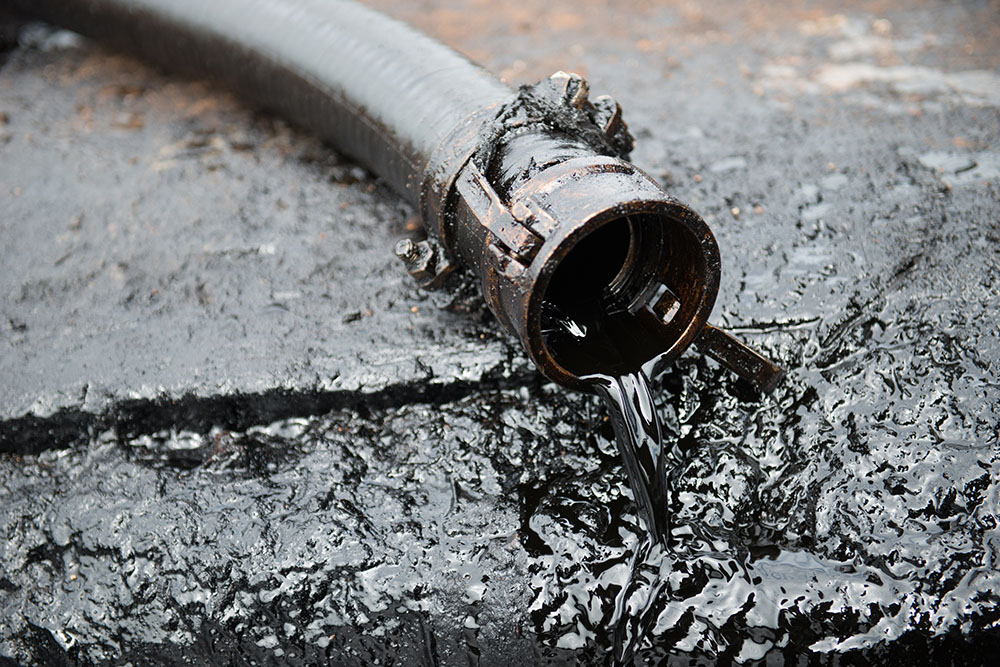Do Oil Spills Cause Air Pollution?

CONTENTS
- Oil spills and air pollution: an overview
- Volatile organic compounds emitted from oil spills
- Particulate matter formation from oil spills
- The combustion of spilt oil and associated air pollutants
- Environmental consequences of oil spills and prevention strategies
- Frequently asked questions
- Get in touch
Oil spills are more than unsightly on landscapes; they also pollute the air we breathe. When oil leaks into the environment, it can release volatile organic compounds (VOCs) and particulates that may negatively impact air quality.
At ICE Cleaning, our oil spill cleaning services cover various situations and surfaces. Whether it is a small spill in your driveway or a large leak in your factory, our team can be on-site the same day to clean in an emergency.
Read on to learn about VOCs emitted from oil spills, how particulate matter forms, and what happens when spilt oil catches fire.
Oil spills and air pollution: an overview
Oil spills are a notorious source of environmental degradation, but their impact goes beyond land and sea. They release pollutants into the air, turning skies grey with emissions that can linger long after the spill is contained. The relationship between oil spills and air pollution is complex yet significant.
When an oil spill occurs, VOCs release - hazardous chemicals like benzene and toluene that escape from crude oil's unrefined mixture with consequences for human health. As these VOCs evaporate, they react in our atmosphere, forming smog that can impact respiratory health and climate.
Particulate matter then combines and reacts with these vapours. It is not just dust but metals that are heavy and polycyclic aromatic hydrocarbons. When these infiltrate your respiratory system, the consequences could be long-lasting.
Volatile organic compounds emitted from oil spills
When oil spills occur, they release VOCs into the atmosphere, affecting air quality and human health, particularly benzene. These VOCs pose real threats to air quality and human health. Among these, benzene stands out as particularly dangerous for its harmful effects.
Benzene is both odorous and toxic and part of the BTEX group – benzene, toluene, ethylbenzene, and xylene – often identified in the aftermath of an oil spill disaster. Together with other hydrocarbons evaporating off the slick surface, they form an invisible cloud that hovers over water and land.
The implications for those living near such incidents mean they are at a higher risk of potential illnesses. This calls for effective monitoring methods like the Environment Agency's methods designed to track these chemicals post-oil spillage.
Particulate matter formation from oil spills
When an oil spill occurs, it not only destroys ocean life and taints coastlines; it can also set off a sequence of events in the air. As crude oil floats on water, it starts to weather. This means lighter spill components evaporate into the atmosphere while heavier ones remain.
Under the sun's rays, VOCs from crude oil spills can react with nitrogen oxides to produce ozone - a component of particulate matter (PM). PM is a combination of tiny particles that are small enough to be inhaled, making them particularly dangerous for our lungs.
With prolonged exposure to sunlight and air, this invisible threat evolves into something more complex - secondary organic aerosols (SOAs). These SOAs contribute significantly to ambient fine particle pollution, adding further risk to the environment and human health.
The combustion of spilt oil and associated air pollutants
When oil spills occur, combustion can be an accidental result or a deliberate action to reduce the spill. Regardless, this process releases air pollutants that threaten our health and environment.
One major concern is the release of nitrogen oxides (NOx). These gases react with sunlight to form ground-level ozone, also known as smog. Smog can trigger asthma attacks, while short-term exposure to NOx is linked to respiratory issues.
Burning spilt oil also sends PM into the atmosphere. These tiny particles can penetrate deep into your lungs and even enter your bloodstream, and they carry carcinogenic substances which can cause cancer.
Environmental consequences of oil spills and prevention strategies
These airborne compounds affect ecosystems and disrupt climate patterns. Ecosystems are hit hard by VOCs and PMs – plants are smothered by contaminated air while animals face disrupted habitats and food sources.
As VOCs alter atmospheric chemistry, they can indirectly boost greenhouse gas concentrations, fuelling climate change. One way to tackle this is by deploying barriers and absorbent materials that prevent oil from spreading.
Skimmers are machines used to remove oil from water surfaces. They work by moving across an affected surface, extracting oil while leaving most of the water behind.
Burning spilt oil might sound counterintuitive, but it is an effective cleaning tactic known as "in-situ burning" if done right. A controlled fire quickly eats through thick layers of surface oil, reducing potential VOC emissions.
Frequently asked questions
Do oil spills cause air pollution?
Oil spills release harmful gases and particulates, harming the air much like exhaust fumes from cars do.
How does oil contribute to air pollution?
Burning or evaporating oil sends volatile organic compounds into the atmosphere, worsening air quality.
How much does oil pollute the air?
The extent varies but large spills can significantly spike local airborne pollutants for days or weeks.
What are the five effects of oil spills?
Oily mists harm lungs; toxic vapours trigger headaches; ecosystems suffer; cleaning is costly; climate change accelerates.
Get in touch
Our oil spill clean-up services are paving the way for excellence and protection in the UK. Our technicians are trained and accredited, using years of experience to utilise the best technology and solutions.
To learn more about our oil spill cleaning services, contact our team today at 0208 066 0360 or enquiries@icecleaning.co.uk. If you are experiencing a spill and require emergency cleaning, our team are available nationwide, 24/7, 365 days a year.

Speak with me today,
I’m here to help
By asking you a few questions either via phone or email I can immediately provide a realistic estimation of the cost.
You’re in good company. We’ve cleaned for the following commercial clients… View all

Why choose us?
- Cater to a wide variety of cleaning situations
- Nationwide coverage, available 24/7
- Cater to commercial and domestic clients
- Free survey provided prior to quotation
- Emergency response team
- Offer a bespoke service designed to suit all your needs
- All technicians hold professional health and safety qualifications, including BICSc, IOSH, Dewpoint Professional & Safe Contractor
We’re fully accredited
We place best practise, professional expertise and health and safety at the core of our business. We’re fully compliant with all legal obligations. You can view a list of our accreditations below, or visit our Health & Safety page for more information.











-RGB-small.1707319151.jpg)




















